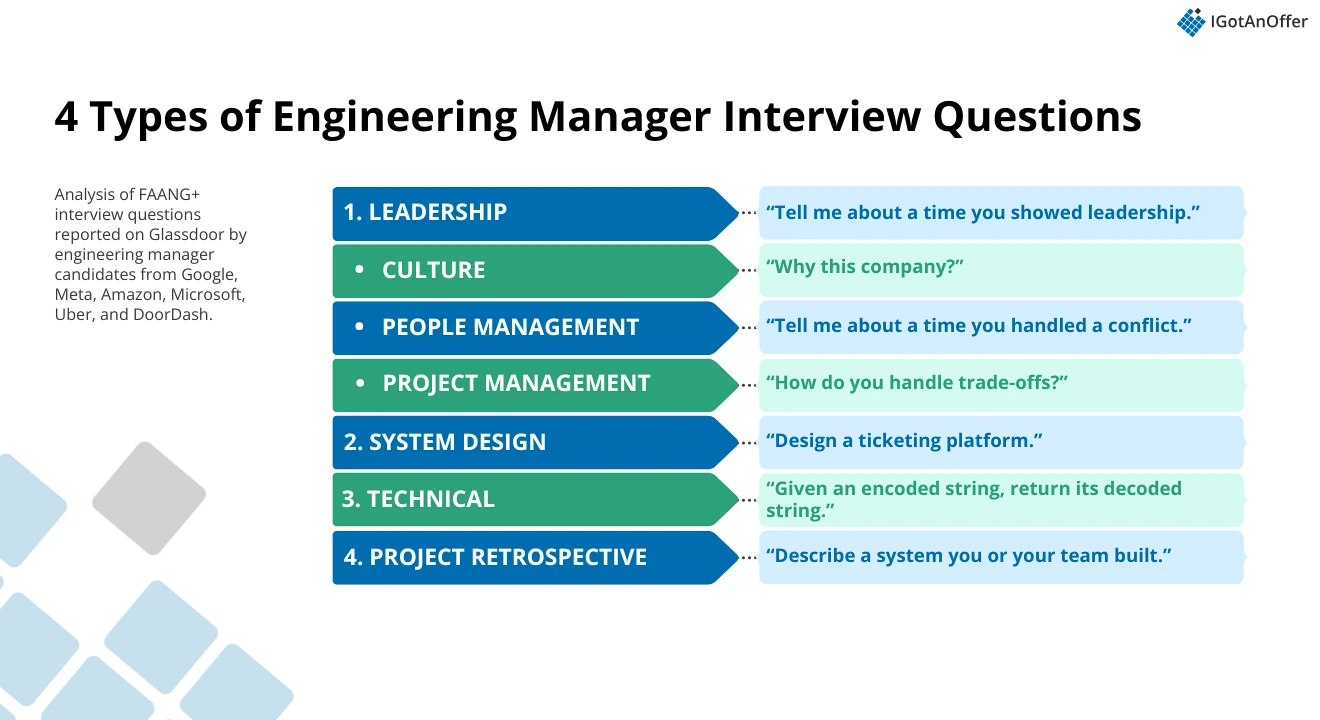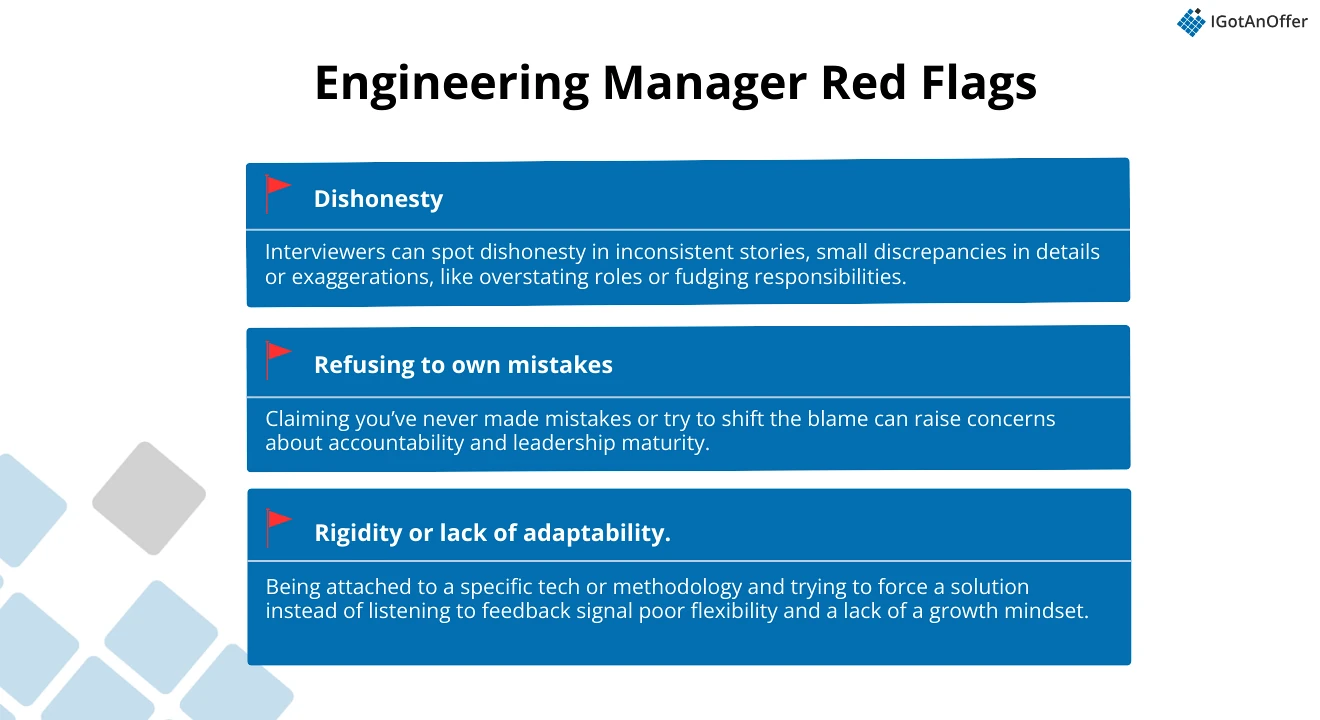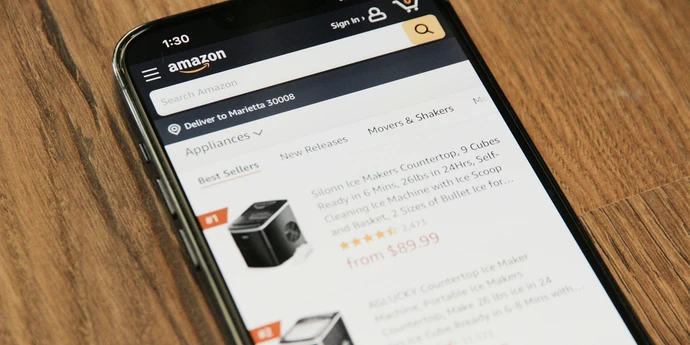This guide is designed to be the perfect starting point for your engineering manager interview preparation.
Step by step, we’ll show you exactly how to prepare, share expert insights from our EM coaches on what you need to stand out, and point you to top free resources.
We’ve helped thousands of EMs land jobs at Meta, Google, Apple, Netflix, and Amazon. Now, we’ve distilled everything into four key steps to help you do the same.
- Step 1: Research your target company
- Step 2: Prepare for all EM question types
- Step 3: Deep-dive (links to top EM resources)
- Step 4: Do mock interviews
Ready? Let's go
Click here to practice 1-on-1 with ex-FAANG interviewers
Step 1: Research your target company↑
Whether you're interviewing at FAANG or a start-up, your interviewers will expect you to thoroughly research the company.
Familiarize yourself with the company's mission statement, core values, and the range of products and services they offer. Highlight how your work can contribute to their goals.
You also need to know that different companies handle the EM interview process differently.
For instance, Amazon heavily emphasizes its 16 Leadership Principles during interviews. Google could give you the option to do coding or code review.
To help you dive deeper into company-specific interview requirements, we've put together the free company guides below. In each, we go into each company's interview process in detail and give tips on how to best prepare for it.
- Meta engineering manager interview guide
- Google engineering manager interview guide
- Amazon software development manager (SDM) interview guide
- Netflix engineering manager interview guide
- Microsoft engineering manager interview guide
- Uber engineering manager interview guide
- DoorDash engineering manager interview guide
No matter which company you're targeting, you'll also want to research their methods and products. Check out their developers' blog (e.g., Uber and Meta) and research their engineering team on LinkedIn. Try and get a sense of the sort of challenges they're facing at work.
Step 2: Prepare for all EM question types↑

The questions you'll be asked in engineering manager interviews can be boiled down into four categories.
- Leadership questions test your ability to lead people and projects while working with cross-functional teams.
- System design questions test your technical knowledge, your thought process, and your familiarity with architecture and scaling.
- Technical questions test your problem-solving skills, coding ability, or domain knowledge.
- Project retrospective questions assess the depth of your experience and ability to articulate goals in terms of business and user impact.
Below, you’ll find an overview of each category, along with ex-Amazon Web Services SDM Mathew’s expert insights on the key skills and characteristics interviewers are on the lookout for in each category.
Mathew has 25+ years of experience in engineering, going from developer to senior engineering leader. He led and built teams and major initiatives at AWS for 8 years, during which he conducted over 100 interviews, most of them with EMs, so he definitely knows what Big Tech companies are on the lookout for.
We also provide links to free resources for a deeper dive into each topic.
2.1 Leadership questions↑
Leadership questions often take the form of "behavioral" questions in that they'll test your past behavior in order to predict future behavior.
Expect leadership questions that fit under these three sub-categories:
- Culture fit questions. Top tech companies make an effort to cultivate their own unique culture. Interviewers will want to understand your motivation for the role and to see whether your personality will have a positive impact on the company's way of doing things.
- People management questions. People management questions tend to dive into how you will lead your team. You can expect questions about how you will get the best out of people, and how you’ll deal with problems and conflicts that may arise.
- Project management questions. These explore how you would effectively lead projects end-to-end. You should expect questions about project management methodologies, your ability to deal with complex and ambiguous situations, and your experience delivering results.
In asking these questions, interviewers like Mathew (ex-Amazon) and Pranav (ex-Meta) will be assessing if you have these essential EM characteristics and skills:
- People leadership. “An EM is not a project manager. They should be about helping people grow,” Mathew says. A good EM will talk about mentoring engineers, supporting promotions, and fostering a culture that makes people want to stay.
- Conflict resolution. Dealing with conflicts and rough patches with a team is an inevitable part of an EM’s job. As a strong engineering manager, you should be able to surface conflicts early, facilitate open communication from all sides, and find a path forward that keeps relationships intact and the work moving. “I want to hear how they approach conflicts with empathy and objectivity,” Mathew says.
- Stakeholder management. A great EM leverages good working relationships with PMs, designers, and business leaders to clarify priorities, push back diplomatically when scope or timelines are unrealistic, and keep alignment without burning out their team, and without significant churn on priorities that can affect team morale.
- Data-driven decision-making. “I expect a good EM to have a structured approach to decisions: being data-driven, considering trade-offs, and making structured arguments to support their stance,” Mathew says. Show that you can be speedy but thorough, avoiding analysis paralysis when deciding, and that you can justify tough calls with data and organizational values/principles.
- Scaling leadership. As an EM in big tech, you should be able to adapt when your team grows. According to Mathew, this means that you recognize when you should “delegate more, add just enough process to guide and make visible team direction, and step back so the team can run.” Another crucial part of this, according to Pranav, is having the ability to manage the multiple hurdles that come while trying to sustain progress in a growing team.
- Growth mindset. Pranav considers having a growth mindset essential to EMs. He wants to know if you can accept feedback openly and work hard to resolve it.
- Dealing with ambiguity. When evaluating EM candidates, Pranav wants to know, “How do you bring structure in place when there is none?” EMs are in charge of bringing clarity to ambiguous situations.
Let’s take a look at some example questions.
Example leadership questions asked in engineering manager interviews
Culture fit
- Tell me about yourself
- Why are you leaving your current job?
- Why this company? (sample answer from Amazon interviews)
- Tell me about a mistake you made and the lesson you learned from it
- When was the last time you did something innovative?
- Tell me about a time you showed leadership.
- How do you deal with high and low performers?
- How do you manage your team’s career growth?
- Tell me about a difficult employee situation that you handled well/not so well.
- Tell me about a time you had a conflict with your supervisor and how you resolved it
- How do you handle conflicts?
- Tell me about what you've been working on over the last year.
- As a manager, how do you handle trade-offs?
- Describe how you deal with change management
- Tell me about a time you handled a difficult stakeholder.
- Describe in detail a project that failed.
When you’re preparing for this part of the interview, we recommend consulting our leadership, people management, and program/project management primers.
Then we recommend reading Grokking the engineering management leadership interview. Written by coach Mark (13 years as an EM at Google), it's a highly insightful deep dive into answering all the types of leadership/behavioral questions.
If the company has published its core values or leadership principles, learn them and practice answers that align with each one.
Engineering manager red flags
During behavioral interviews, interviewers are also on the lookout for possible EM red flags. These are some examples Mathew cites:
- Dishonesty. Interviewers can spot dishonesty in inconsistent stories, small discrepancies in details or exaggerations, like overstating roles or fudging responsibilities.
- Refusing to own mistakes. Avoid claiming you’ve never made mistakes or try to shift the blame. This can raise concerns about accountability and leadership maturity.
- Rigidity or lack of adaptability. If you’re attached to a specific tech or methodology and trying to force a solution instead of listening to feedback, showing no regard for context, it signals poor flexibility and a lack of a growth mindset.

2.2 System design questions↑
The products offered by big tech companies typically have huge user bases to support. To qualify as an engineering manager, you’ll therefore need to demonstrate an ability to design highly scalable systems.
During system design interviews, interviewers like Mathew are looking for the following skills:
- Problem framing. You’re not expected to come up with a flawless design, but you should be able to clarify vague requirements into concrete business goals. What does this entail? “Asking the right questions to clarify what problem you’re solving and aligning business goals and needs with technical feasibility, team capability/maturity,” Mathew says.
- Knowledge of high-level architecture. You’re not expected to design every API in detail during an interview (though you should show evidence of being able to do so if needed, with some study). Instead, you should be able to show how the system components fit together and why system boundaries exist where they do.
- Ability to justify trade-offs. To differentiate yourself as a great EM candidate, you should be able to weigh scalability, performance, cost, and complexity. “I expect a thoughtful discussion on why one design was chosen over another, and how to balance 'move fast now' versus 'pay down later, ’” Mathew says. He also says he wants to hear candidates discuss technical debt, in particular, how to address running down that debt.
- Accounting for the system lifecycle. To be a strong EM candidate, you should think beyond the initial build. To demonstrate this, Mathew’s advice is to “highlight how your design choices allow incremental scaling, modular upgrades, and smooth migrations rather than one-off solutions that are not robust enough to withstand change.”
Here are some example system design questions asked by Google, Meta, and Amazon.
Example "Design X" system design questions asked in EM interviews
- Design TikTok
- Design a system that reads book reviews from other sources and displays them on your online bookstore?
- Design a short URL system
- Design a real-time comment system to go under a Facebook post which may have millions of concurrent active users
- How would you use a load balancer for memcache servers?
- Design a ticketing platform
- Design a boggle solver
- Design a distributed ID generation system
- Design a system that counts the number of clicks on YouTube videos
To help you dig deeper, refer to our guide to system design interview questions. There, you’ll find an answer method and concepts you’ll need to break down each question, as well as extra resources to help answer the questions above.
We also recommend watching this deep dive into system design interviews from EM coach Mark (ex-Google and Uber).
2.3 Technical questions↑
Engineering managers spend more time leading and using their soft skills than getting technical and writing code, etc. But they still need excellent technical knowledge to help their teams tackle some of the most important and complex challenges their companies face.
Therefore, some companies will want to test you directly on your technical skills (in areas outside system design). Google, for example, asks engineering manager candidates to write or review code.
Other top companies, such as Amazon, typically don't ask coding questions in engineering manager interviews. But you can expect the interviewer to ask questions that test your technical knowledge.
As a rule of thumb, if you're told you'll have a coding interview as an EM candidate, you can expect "medium difficulty LeetCode" type questions.
If you’re unsure whether to expect coding questions in your interviews, check with your recruiter.
According to Mathew, here are some of the skills and characteristics he wants to see in an EM candidate during a technical interview:
- Baseline coding ability. As an EM, you won’t be coding daily. But you’ll still want to show you can write clean functional code under pressure. “This shows credibility and that you haven’t lost touch with fundamentals,” Mathew says.
- Practicality and algorithmic thinking. “A good EM favours clarity and maintainability.” This means you prefer readable code that junior engineers can understand over “smart” code that only a senior can decipher. Additionally, you know how to spot and avoid inefficient solutions and can implement practical optimizations.
- Code review mindset. In some companies, like Google, you may get a code review interview, where you can showcase this skill. According to Mathew, a good EM will be on the lookout for logical structuring, thoughtful naming, and documentation habits that scale when reviewing code.
- Breadth of exposure. You don’t need to be an expert in every paradigm (e.g., event-driven, distributed, functional) and stack, but you should at least show some familiarity with most. Mathew says that this signals a candidate can lead diverse teams credibly.
- Respect for senior engineers’ expertise. As an EM, you’ll most likely be working closely with highly competent and accomplished engineers. Your task, as a manager, is not to dictate to them what to do. Instead, you’re expected to use your technical skills to facilitate and unblock without overstepping, and to listen to technical arguments that run contrary to your thinking.
The questions below come from Glassdoor data on Google engineering interviews. We’ve taken some questions from non-management software engineer interviews, as there is more data available for those roles. However, these questions should also be relevant to management candidates.
Example coding questions asked at engineering manager interviews
- Given the root node of a binary search tree, return the sum of values of all nodes with value between L and R (inclusive). (Solution)
- Given a binary tree, find the maximum path sum. The path may start and end at any node in the tree. (Solution)
- Given an encoded string, return its decoded string. (Solution)
- Implement a SnapshotArray that supports predefined interfaces (note: see link for more details). (Solution)
- Given an array nums of n integers where n > 1, return an array output such that output[i] is equal to the product of all the elements of nums except nums[i]. (Solution)
- Given a matrix and a target, return the number of non-empty submatrices that sum to target. (Solution)
- Say you have an array for which the ith element is the price of a given stock on day i. If you were only permitted to complete at most one transaction (i.e., buy one and sell one share of the stock), design an algorithm to find the maximum profit. (Solution)
- A strobogrammatic number is a number that looks the same when rotated 180 degrees. Find all strobogrammatic numbers that are of length = n. (Solution)
To brush up on your technical skills, we recommend reading our coding interview prep guide. There you’ll find a good answer framework to use when solving coding problems, and more questions to practice with.
If you’re given the option to do a code review, check out our Google code review guide. It’s written for Google, but the principles apply to other big tech companies as well.
2.4 Project retrospective questions↑
Project retrospective questions are often cited in reports for senior leadership roles as part of the behavioral section of an interview. They can come up in coding or system design interviews as well.
In some cases, you might be asked to create a quick presentation on a particular project, followed by a Q&A, but that is not always the case.
During retrospective interviews, these are some of the qualities you’ll need to stand out, according to Mathew:
- Outcome clarity. When talking about a project, you should be able to articulate project goals in terms of business or user impact, not just technical milestones. Explain whether those goals were met, how you measured success, and how the outcomes meet those measures.
- Planning rigor. Go deep and specific into how you go about project planning. Talk about how you scoped projects, estimated work, allocated resources, and adjusted plans when constraints shifted.
- Execution ownership. To demonstrate your strength as an EM, you should talk about how you actively took responsibility for execution, managing risks, dependencies, and blockers rather than passively relying on ICs or PMs. “I want to hear about tough situations—slipping deadlines, misaligned stakeholders, or technical hurdles—and how you led the team through them without morale collapse,” Mathew says.
- Metrics and impact. Interviewers want to see EMs who have rigor and a results-oriented mindset. The best way to show this is to talk about results with numbers, e.g., latency improved by X%, adoption grew by Y%, revenue increased by Z.
Example project retrospective questions asked at engineering manager interviews
- Describe a system/product/app you or your team built.
- How did you evaluate the design of your system?
- How did you test performance and scalability?
- Describe the bottleneck of the system you designed.
- Tell me about a time you scaled a system
- Describe a software development project you led and your approach.
- Describe the most technically complex project that you have worked on and why it was complex.
- Talk through a project, product, or system you worked on: the design, technical problems you faced, how you solved them, trade-offs, etc.
We recommend reading this guide to technical presentations/retrospectives (by ex-Meta Tony Wu) to learn best practices for this type of interview.
Senior engineering manager interview prep
If you’re applying for a senior EM post, you can prepare for the same types of questions as the ones we’ve listed.
What you may need to double down on are your project retrospective and leadership interviews. Be prepared to talk about long-term and large-scale projects (meaning, avoid talking about one-month features).
Most senior EM candidate reports online also note that interviews for this level always entail questions about how you handled failure in the past.
For such questions, the number one rule is to be honest. Don’t pull the ‘my weakness is that I work too hard’ card. Instead, talk about the failure objectively and how you pulled your way through with your team, and what you learned in the process.
Step 3: Deep-dive (links to top EM resources)↑
The resources above give you a solid foundation on key EM topics, but to truly master them, you'll sometimes need to go deeper.
Here are some resources that you may find useful. They’re a mix of our own deep dive guides and some that we highly recommend from other sources.
Leadership
- Ryan Burgess’s Engineering Manager Repository
- The Engineering Manager 101
- Making the Transition from Software Engineer to Software Engineering Manager
- KPIs every engineering leader should track
- Grokking the engineering manager interview
Technical
- The Ultimate Data Structure Interview Questions List
- Google GitHub: What do code reviewers look for?
- System design fundamentals
Day-in-the-life of an engineering manager
- Being an Engineering Manager at Meta
- Google Engineering Manager AMA on Reddit
- Day in the Life of a Senior Manager at Amazon
Company-specific engineering manager interview guides
- Meta engineering manager interview guide
- Google engineering manager interview guide
- Apple engineering manager interview guide
- Microsoft engineering manager interview guide
- Uber engineering manager interview guide
- DoorDash engineering manager interview guide
Engineering manager interview best practices
Being technically proficient and having years under your belt can go a long way, but they won’t guarantee you that engineering manager post. You’ll need to build your interviewing skills and confidence in order to stand out. Below are some tips and best practices from our EM coaches.
#Tip 1. Show that you have a growth mindset
At top companies, you'll continuously face new and different challenges, and you'll need to adapt quickly and learn fast. Interviewers are on the lookout to see if you have a growth mindset, which will help you adapt and learn in new situations, versus someone who is stuck in their ways.
"Do the stories and experiences that you're giving show that you're always looking to grow and learn, rather than having a fixed mindset? That's an important signal the interviewer is looking out for," says Mark.
#Tip 2 Show humility
Humility is an important trait in an engineering manager, so you should make sure to convey that you have it.
You can do this in various ways. For example, be open about failures when you're answering leadership/behavioral questions, or reacting positively to hints from the interviewer about the limitations of your design in a system design interview.
"The interviewer wants to see that you're someone who is truly willing to admit their mistakes and take responsibility for them," says Mark.
Similarly, you should be brave enough to say, “I don’t know” if that’s the truth. “Some candidates overly elaborate or bluff instead of acknowledging gaps, undermining credibility,” Mathew says.
His tip for such instances is to acknowledge it confidently and show how you'd learn or navigate it. This not only shows humility but also a growth mindset.
#Tip 3. Differentiate between different types of leadership questions
In leadership interviews, it's important to give the interviewer the kind of answer they're looking for.
If they ask you a "tell me about a time" question, that's your cue to give them a well-prepared story from your past. But if they give you a scenario, they want you to answer in the hypothetical. Likewise, if they ask about your skillset, avoid giving a long anecdote and instead list some of the leadership tools you use.
#Tip 4. Read the interviewer
Different interviewers have different personalities, and the tone and energy of the interview can vary depending on that. Be yourself, but read the interviewer. If they're being very formal and serious, then you should keep your answers on point.
#Tip 5: Communicate efficiently
An interview is an artificially compressed time. You won't be used to working and talking about things at this speed, and so you need to communicate with the interviewer efficiently. This takes practice. Especially for technical rounds, where you need to be sure that the interviewer can follow your thought process.
One such trap that candidates typically fall into is repeating what’s in the CV. Mathew’s tip for this: “Craft a refined 60–90-second introduction that highlights who you are, what sets you apart, the business impact you’ve had, and what you're aiming for next.”
#Tip 6: Explain your thinking
For technical rounds such as system design and coding, give your reasons as to why you're making each choice you do. Why did you choose one particular technology over another one?
"The interviewer wants to understand what's behind your thinking in order to assess your level of technical judgment," says Mark.
#Tip 7: Practice answering questions in a concise, detailed, and structured manner
There is a knowing and doing gap when it comes to interviews. Learning the theory and reading prep guides is great, but you need to practice out loud with friends or experts, or at least record yourself and watch yourself back.
Here are some common interview pitfalls and how you can avoid them:
- Generic claims. To avoid this, be sure to cite results that are measurable.
- Listing routine management tasks. To avoid this, focus on leadership stories directly tied to outcomes that matter: revenue, efficiency, team retention, or product metrics.
- Meandering answers. To focus your answer, practice answering using a framework that works for you.
"If you do some mock interviews, which are hugely helpful, ideally allow time for a long feedback and conversation afterward," recommends Mark.
This brings us to our next steps.
Step 4: Do mock interviews↑
Once you’re in command of the subject matter, you’ll want to practice answering questions. But by yourself, you can’t simulate thinking on your feet or the pressure of performing in front of a stranger. Plus, there are no unexpected follow-up questions and no feedback.
The easiest way to start practicing under simulated interview conditions is to practice interview questions out loud or with peers.
4.1 Practice with peers or friends
If you have friends who can do mock interviews with you, that's an option worth trying. But be warned, you may come up against the following problems:
- It’s hard to know if the feedback you get is accurate
- They’re unlikely to have insider knowledge of interviews at your target company
- On peer platforms, people often waste your time by not showing up
For those reasons, many candidates skip peer mock interviews and go straight to mock interviews with an expert.
4.2 Practice with experts
In our experience, practicing real interviews with experts who can give you company-specific feedback, like Mathew, Pranav, and Mark, makes a huge difference.
Find an engineering manager interview coach so you can:
- Test yourself under real interview conditions
- Get accurate feedback from a real expert
- Build your confidence
- Get company-specific insights
- Learn how to tell the right stories, better.
- Save time by focusing your preparation
Landing a job at a big tech company often results in a $50,000 per year or more increase in total compensation. In our experience, three or four coaching sessions worth ~$500 make a significant difference in your ability to land the job. That’s an ROI of 100x!















